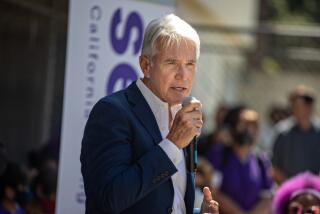Lawyers Seek to Drop Witness in Simpson Case
- Share via
Lawyers pressing a wrongful-death suit against O.J. Simpson have asked a judge to remove Henry Lee from the defense’s expert witness list if the soft-spoken criminalist--whose pronouncement that “something’s wrong” helped win Simpson speedy acquittals in the criminal trial--does not intend to testify at the upcoming civil trial.
In a motion made public Monday, lawyers representing the relatives of murder victim Ronald Lyle Goldman argued that a judge should drop Lee from the witness list because the defense had not provided an affidavit declaring Lee’s willingness to testify on Simpson’s behalf.
Lee provided pivotal testimony for Simpson during the criminal case, describing errors in police handling of blood evidence, depicting the murders as a long struggle rather than a swift execution and declaring that there “could be” imprints from a second killer’s shoe at the crime scene. But after he left the witness stand, Lee expressed dismay at how his cautious assessments were treated as sensational revelations. Back home at the Connecticut State Forensic Science Laboratory, he indicated that he did not wish to testify again in the Simpson matter, even if the defense team needed him for the rebuttal phase of the criminal trial.
By demanding a public hearing on whether Lee belongs on Simpson’s expert witness list for the civil case, Goldman family attorney Daniel M. Petrocelli may be trying “to smoke out the defense, to get them to acknowledge that he is not, in fact, going to testify,” said Los Angeles civil lawyer Doug Mirell.
If they are assured that Lee will not take the stand, the plaintiffs’ lawyers will be spared preparing for a witness who clearly impressed jurors. With the trial due to begin in just two months, Mirell added, “any savings [in preparation time] would be pretty valuable.”
Defense lawyers did not return calls seeking comment about Lee. Their written brief responding to the plaintiffs’ motion was not available to the public Monday.
Superior Court Judge Alan B. Haber is scheduled to take up the matter next week.
Meanwhile, Haber handed the plaintiffs a victory on an unrelated issue Monday. After a brief hearing in Santa Monica, he ordered Simpson’s attorneys to review all the exhibits introduced as evidence in the criminal trial--from bloodstained socks to autopsy photos to love letters--and either admit their authenticity or explain their reasons for challenging them.
The ruling pressures Simpson’s lawyers to lay out the precise strategies they will use in defending their client. They cannot simply say they intend to dispute notes the coroner took during autopsies, for example, but must list the evidence that leads them to question the authenticity or accuracy of those notes.
Haber’s decision mirrored rulings he handed down two weeks ago requiring defense attorneys to answer more than 500 written questions probing their position on everything from the validity of DNA tests to the presence of Ronald Goldman’s blood in Simpson’s Ford Bronco.
Both times, Haber rejected defense arguments that answering the questionnaires would unfairly prod Simpson’s lawyers into revealing their tactics. Haber also turned aside the defense argument that the questions were designed more to harass Simpson’s team than to elicit useful information.
Instead, Haber called the questions a “good-faith effort to narrow the issues that will be raised at trial.” Far from wasting time, he said, the questionnaires could push the civil trial along at a snappier pace than the marathon criminal proceeding by eliminating the hours spent authenticating various pieces of evidence.
If the defense agreed, for example, that tapes of Nicole Brown Simpson’s 911 calls were genuine recordings, either side could present them to jurors without asking the operators who took the calls to come to the witness stand and authenticate them.
Lead Simpson attorney Robert C. Baker, who called the plaintiffs’ pile of questions “a textbook example of legal extortion,” said he was “seriously thinking” of appealing the judge’s ruling.
In other developments Monday, lawyers disclosed that Dr. Ronald Fischman, who chatted with Simpson at a dance recital a few hours before the murders, will submit to questioning under oath this week. Fischman had evaded previous attempts to depose him, and Judge Haber last month issued a warrant for his arrest.
Plaintiffs’ attorneys want to grill Fischman not only about Simpson’s mood at the dance recital, but also about a bottle of Xanax, an anti-anxiety drug. Fischman prescribed the Xanax for a relative of his, but the bottle turned up in the bag Simpson took with him when he fled arrest five days after the murders. Simpson said he took the bottle from Nicole Simpson because he was concerned that she was abusing drugs or alcohol.
Also Monday, The Times obtained deposition testimony of three close friends of Simpson who said they never saw him show a violent temper. While defense attorneys could tout such testimony to support their portrait of Simpson as easygoing, the plaintiffs’ lawyers may argue that the football hall of famer had a split personality: charming and relaxed with friends, violent and unpredictable with his wife.
All three friends--Robin and Robert Bender and Hertz Corp. Chairman Frank Olson--met with Simpson on the East Coast shortly before the murders. Robert Bender said Simpson seemed tired and perhaps depressed about the failure of his marriage, and talked at length about how he wished the marriage had worked.
Olson described Simpson as “melancholy” and said Simpson talked repeatedly about his failed attempt to reconcile with his ex-wife. Although he signed autographs as always, Simpson “was not his usual outgoing effusive self,” Olson said. Simpson added that he was thinking about moving to New York “to get away from it all,” Olson said.
More to Read
Sign up for Essential California
The most important California stories and recommendations in your inbox every morning.
You may occasionally receive promotional content from the Los Angeles Times.













